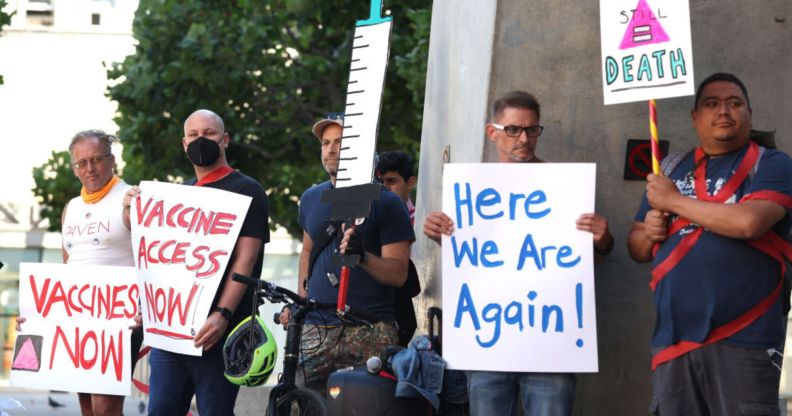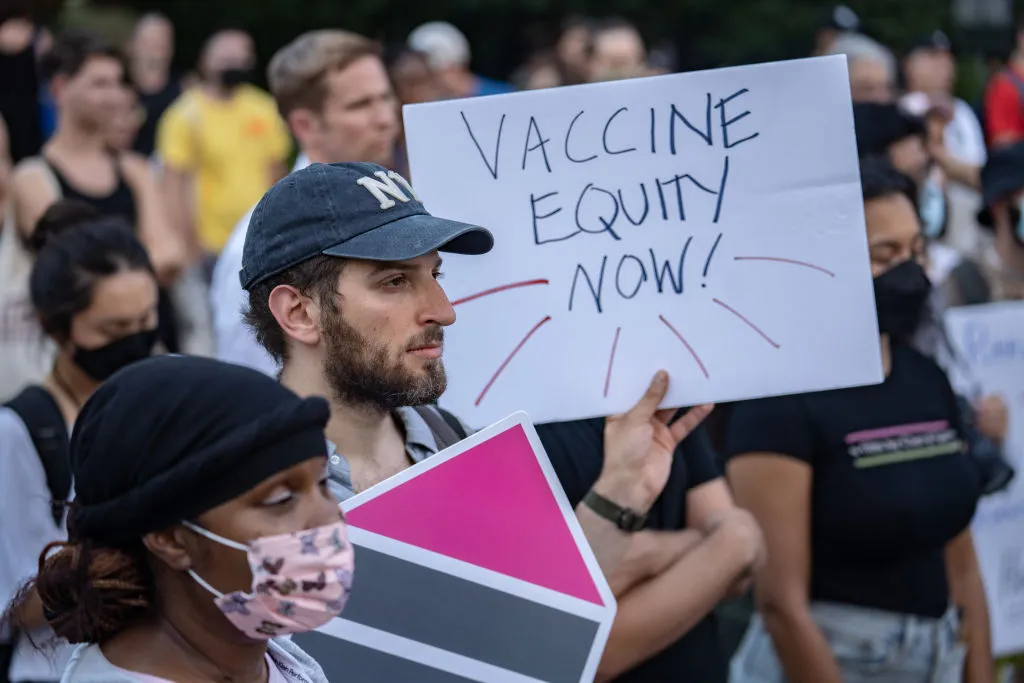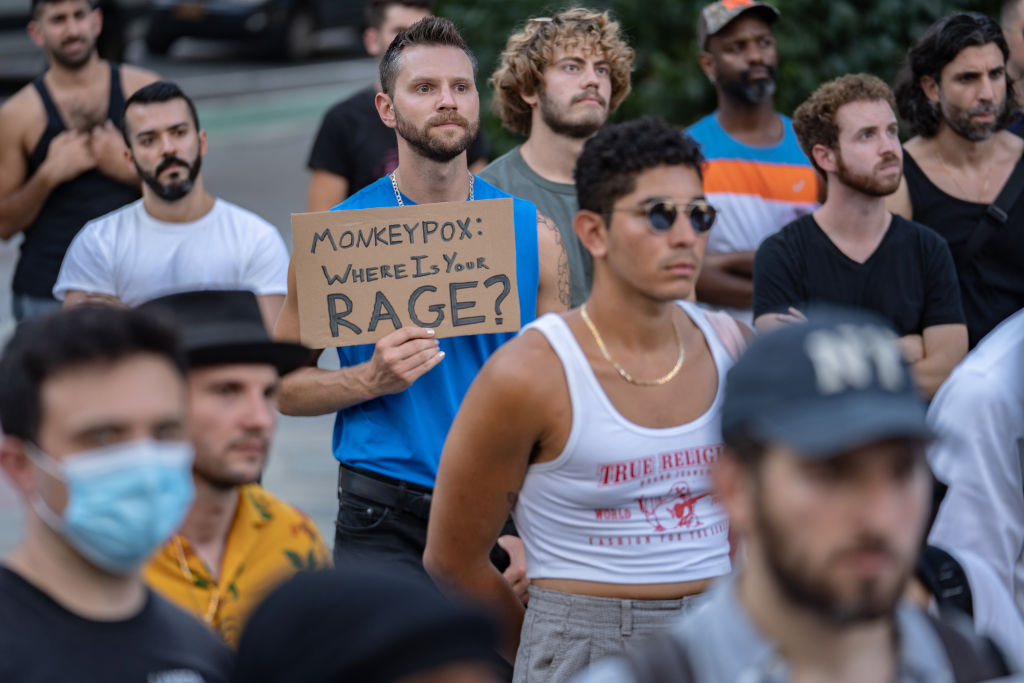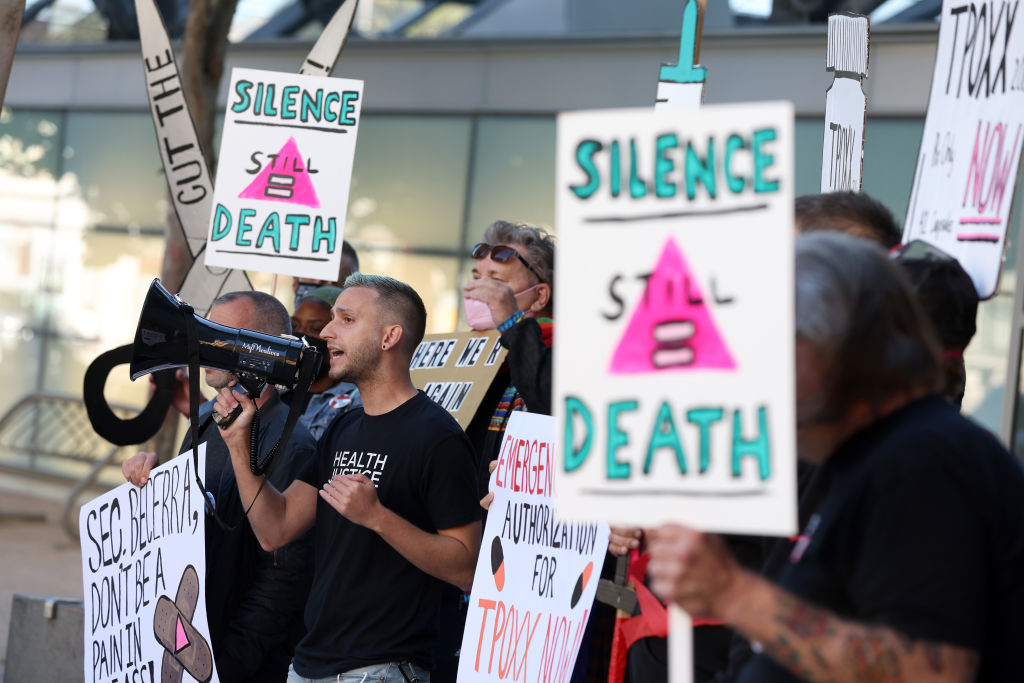How the LGBTQ+ community came together to stamp out mpox in spite of Tory government

The LGBTQ+ community comes together for a protest about monkeypox. (Getty)
Less than a year after the emergence of mpox among gay and bisexual men, the outbreak has been largely contained – thanks to, experts agree, the actions of the LGBTQ+ community.
In May 2022, headlines started to be appear about the unexpected and alarming spread of monkeypox, since renamed mpox, among queer men.
It had been endemic in parts of West and Central Africa for some time, but it was unusual to see cases in Europe and North America. It soon became clear it was being spread through sexual networks.
For many queer people, the news brought back painful memories of the AIDS epidemic. It was this collective memory that experts agree informed the incredible response from within the LGBTQ+ community, which came together while government agencies floundered.
As a result, new cases have all but stopped. The UK government stopped publishing regular regional mpox updates in December 2022 “due to low case numbers”, with its last update showing zero new cases.
Dr Claire Dewsnap, the president of the British Association for Sexual Health and HIV (BASHH), says “communication across the LGBTQ+ community was unbelievable” when it came to mpox. Twitter posts about which clinics had vaccine stocks were common throughout the height of the outbreak, information which wasn’t being clearly communicated officially.
“That linked in nicely with the work done by charities and local organisations who were heavily involved in sharing information about where to get tested and where to get vaccinated,” says Dewsnap.
The vaccination scheme was important, but, as Dewsnap says, that wasn’t the only thing that drove down transmission. What was also vital is that for a period of time many people actively changed their sexual behaviour to protect themselves.

“That was certainly partly responsible for the outbreak coming down. We think that probably had more of an impact initially than any vaccine,” she says.
“People really thought it was not only their responsibility to protect themselves, but to protect the community – it was unbelievable and probably almost immeasurable how much of a difference that made.”
Because of her own experience working in sexual health, Dewsnap wasn’t surprised by how quickly queer people moved into action.
“Working in sexual-health clinics, we know our patients. I personally knew exactly what was going to happen. Governmental organisations didn’t understand.”

Dewsnap agrees that the community’s response was at least partly informed by its history with HIV and AIDS.
“It’s both brilliant and sad that that’s true,” she says.
“There were people commenting about how they felt stigmatised by monkeypox and that it felt similar to the way they were stigmatised by HIV, and that is really sad.
“That’s possibly what drove some of the behaviour change and that upsets me. We still see that at a national level – behaviour change is an acceptable way of managing an outbreak and as far as I’m concerned it shouldn’t be because we have plenty of other tools in the box.”
Matt Phillips, a consultant who works with BASSH, also noticed the spectre of HIV in the queer community’s response.
“I was privileged enough to be part of different conversations, and the core of all of them was, ‘this doesn’t have to be like HIV. This is about information, it’s about us knowing what we want to do, it’s about us striving for solutions very quickly’.

“There was a revisiting of that… elder members of our community were talking about how it felt the same as when HIV broke out. I think it really did inform the reaction.”
Government failed to listen to LGBTQ+ people on mpox
While LGBTQ+ communities and sexual-health services leapt into action, many were critical of the response from government. In October, the Terrence Higgins Trust withdrew from meetings with the UK Health Security Agency over “serious concerns” about its “communication and health promotion approach”. Sexual health clinics were left to deal with testing and vaccinations without additional funding, and at one point the supply of jabs dried up entirely.
Dewsnap says: “What was poor about it was that they seemed to think they had achieved these gains when in fact the credit really has to go to people who access the services and those [who] deliver[ed] the services on the frontline.
“They didn’t hear what we were saying and they’re still not really hearing us, which bothers me, because although we’ve got rid of monkeypox right now there’s absolutely no reason to say we couldn’t have a new outbreak. I suspect that’s what will happen.”
Her message to the government is stark: “Listen to the experts who see these patients day in and day out. Stop controlling things from the centre and do more work in a collaborative way with charitable organisations that work with communities very closely and understand their needs.”
How did this story make you feel?

